Why Emrakul, the Promised End is the Second-Best Eldrazi Ever Printed
While official previews for Eldritch Moon don't start until tomorrow, Wizards decided to get a head start on the fun this time around by showing off a handful of new cards, including a new version of Magic's biggest baddy, a new member of the Cunning Wish cycle, and a much meaner version of Thalia. Initially, my plan was to cover all of the early spoilers today, but it looks like Thalia, Heretical Cathar and Ulrich of the Krallenhorde will have to wait, because I have an entire article worth of thoughts on Emrakul, the Promised End. If you're interested in the other cards, don't worry. We have a ton of Eldritch Moon content over the new couple of weeks as the previews roll out!
Emrakul, the Promised End
It amazes me that the opinions on Emrakul, the Promised End are so divided. I've been pulling my hair out all week trying to explain to people why this card is absurd. The very fact that a not-insignificant number of Magic players disagree is shocking. When it was first previewed, I assumed it would be one of those cards that everyone understood to be powerful immediately, but since this is clearly not the case, let's break down why Emrakul, the Promised End is insanely powerful. In fact, discounting older formats, I think the new Emrakul is clearly more powerful than Emrakul, the Aeons Torn when it comes to Standard.
She's a 13/13 with Flying and Trample for 8–10 Mana
Imagine there was no other text on Emrakul, the Promised End, and she was simply a huge flying, trampling monster. This card would already be extremely powerful, especially when you consider that you'll usually be casting her for somewhere between 8 and 10 mana. Over the course of Magic's history, there have only been two other fliers with a power of 10 or greater.

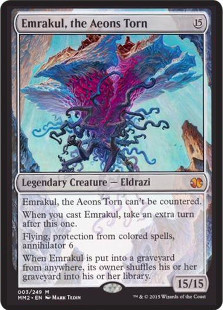
The first is Supreme Exemplar, which not only gets chumped by Lingering Souls tokens for infinity, but also makes you exile one of your own creatures when it enters the battlefield. The second? Emrakul, the Aeons Torn, quite possibly the most powerful creature ever printed. Flyers that can close out the game in two hits are extremely rare, but even discounting flyers, Emrakul, the Promised End is above the curve for ground creatures with Trample.



Let's say you want a huge trampling ground creature to close out the game. First, there really aren't many options unless you're willing to deal with massive downsides like the ones found on Polar Kraken and Jokulmorder. Second, to get a 10-power trampling ground monster, you're going to have to pay 11 or 12 mana for things like Blightsteel Colossus or Worldspine Wurm. Of course, some of these creatures are Indestructible, but you can make a good argument that in our current exile-based Standard, protection from instants is more relevant than having Indestructible.
The point is, if you look at creatures in terms of raw power, toughness, mana cost, and level of evasiveness, Emrakul, the Promised End is the second-most-powerful creature ever printed, behind Emrakul, the Aeons Torn. I've heard some people complain that the new version of Emrakul needed to top the older version to be considered a success, but personally I'm thankful this didn't happen. The mistake here isn't that Emrakul, the Promised End is lacking in power; instead, it's that Emrakul, the Aeons Torn was too powerful. Emrakul, the Aeons Torn is so good and so unstoppable that, no matter what Wizards does, they can't (and shouldn't) top her. I mean, even in making this list, I looked at Worldspine Wurm, which potentially makes 30 trampling power and toughness for 11 mana, and shrugged my shoulders. We live in a world where a 10/10 protection from everything (Progenitus) isn't good enough to cheat into play anymore. So, don't be upset that Emrakul, the Promised End isn't as good as the most powerful creature ever printed. If anything, be disappointed that Emrakul, the Aeons Torn was so far above the curve that now we look at epic creatures like Emrakul, the Promised End with disappointment.
The Cost Reduction
Technically, Emrakul, the Promised End costs 13 mana, but it's very unlikely you'll ever pay full price thanks to the pseudo-Delirium cost-reduction ability. In theory, this could make Emrakul, the Promised End cost as little as five mana, although this isn't going to happen in Standard. So, just how much should you expect to pay for Emrakul, the Promised End?
First off, I'm running on the assumption that most decks aren't going to intentionally mill themselves to make Emrakul, the Promised End cheaper. While this could happen, I think it's more likely that you play a regular deck and the first spell of each type you get into the graveyard over the course of the game comes with a Lotus Petal attached.
Out of all the current decks in Standard, GR Eldrazi Ramp seems like the most natural fit for Emrakul, the Promised End. Looking at the deck list, it seems fairly likely you'll have an enchantment (Oath of Nissa), instant (Kozilek's Return), and sorcery (ramp card) in the graveyard by the time you want to cast Emrakul, the Promised End, which would make it a 10-drop. It's also not unreasonable that you'd have a creature, planeswalker, or artifact in the graveyard as well, bringing the cost down to 7 or 8 mana. Another possibility is to run some copies of Evolving Wilds, which in theory could get the cost all the way down to 6 and gets us into magical Christmas land territory.
As such, in a normal deck, I'd plan on paying 10 mana for Emrakul, the Promised End, hope to pay 8 mana, and know that every once in a while, she could cost as little as 6 mana. In a dedicated Delirium/self-mill deck, I'd plan on paying 8 mana and try to build my deck in such a manner where I'd have a fairly high likelihood of paying 6 mana. The biggest deal is getting Emrakul, the Promised End down below 10 mana, so she isn't fighting with Ulamog, the Ceaseless Hunger for the same slot on the curve. Having to choose between Emrakul, the Promised End and Ulamog, the Ceaseless Hunger is painful. Curving World Breaker into Emrakul, the Promised End into Ulamog, the Ceaseless Hunger is insane.
Protection from Instants
I should say that, for the rest of the article, we'll be focusing primarily on Standard. In Legacy and Modern, huge, expensive creatures typically only see play when they are being cheated into play by things like Nahiri, the Harbinger or Show and Tell, and when you're on the sneak-and-show plan, Emrakul, the Aeons Torn and Griselbrand are clearly the better options. I could see Emrakul, the Aeons Torn possible being a one-of in Modern Tron, especially if a UW build with a Coax from the Blind Eternities sideboard plan takes shape, but otherwise, Emrakul, the Promised End doesn't have much appeal in older formats.
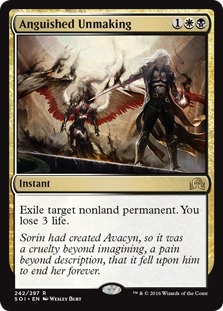
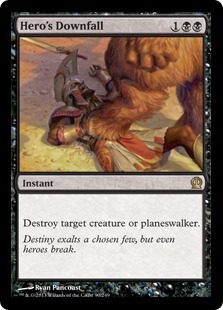
So, just how good is protection from instants in Standard? Right this second, it's not really all that important. Out of the 50 most played spells in Standard, having protection from instants means Emrakul, the Promised End dodges exactly one spell: Anguished Unmaking, which is currently 43rd on the list. However, this isn't all bad news. The biggest reason that protection from instants isn't all that important is because Wizards hasn't given us any good instant-speed removal spells, and this could certainly change over the next set or two. I mean, one Hero's Downfall and suddenly, protection from instants goes from fringe to extremely relevant.
The other reason protection from instants isn't all that important is because Emrakul, the Promised End naturally dodges some instant-speed removal. Dromoka's Command is the third-most-played spell in Standard and also an instant, but it seems unlikely that you'll ever have a creature big enough to fight Emrakul, the Promised End. Ultimate Price can't hit Emrakul, the Promised End because it's colorless, and you'd need a truly epic number of Grasp of Darknesses or Fiery Impulses to be able to take down a 13/13.
So, What Beats Emrakul?
While we haven't really talked about Emrakul, the Promised End's ability to steal an opponent's turn yet, in talking about the removal that can beat Emrakul, we need to look at two separate things: spells that can interact with Emrakul, the Promised End before your opponent gets to control your turn, and spells that can can deal with Emrakul, the Promised End after your opponent steals your turn.
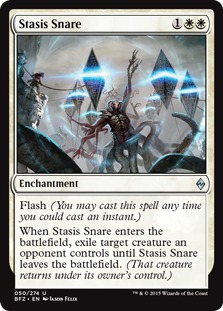


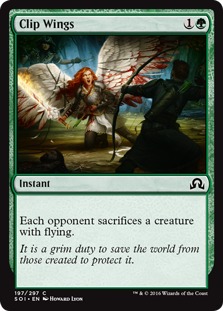
The options for dealing with Emrakul, the Promised End are limited. As far as actual removal, Stasis Snare is the one of two options, the other being Clip Wings, which is a solid sideboard plan but probably not main-deck playable. The problem is that Stasis Snare isn't all that great in a Standard where Dromoka's Command is one of the best spells and some number of players are ramping into Ulamog, the Ceaseless Hunger. That said, if Emrakul, the Promised End becomes a major part of Standard, it could see an uptick in play, at least in sideboards, as a way to deal with Eldrazi.
Maybe the better answer is counterspells like Ojutai's Command, Clash of Wills, and Spell Shrivel, but even here things are problematic. Sure, you keep the 13/13 off the battlefield, but you're opponent still gets to play your turn and will likely end up with a three-, four-, five-, or even six-for-one. While getting six-for-one'd without your opponent having a 13/13 on the battlefield is better than getting six-for-one'd while your opponent has an Emrakul, the Promised End, it's still not good, and in many cases, the "steal a turn" trigger will cause you to lose the game, even if you can counter the Emrakul, the Promised One.
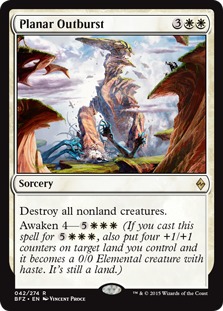
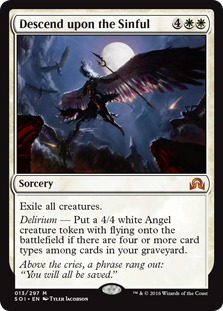

Running on the assumption that when your opponent steals your turn they empty your hand of Declaration in Stone, Ruinous Path, and other removal (mostly likely targeting your own creatures), what card can save you? First and foremost, a lucky top deck will take care of the problem. Emrakul, the Promised End doesn't steal the top card of your deck, so even if your opponent empties your hand while they control your turn, you still have the out of drawing a sorcery-speed removal spell to stay alive. However, much like countering an Emrakul, the Promised End, the damage is likely already done. Sure, you deal with the 13/13, but you're empty handed, lost several of your creatures, and had all kinds of bad stuff happen to you while your opponent was playing your turn.
As for cards that you can have in your hand, your best bets are real wraths like Descend upon the Sinful and Planar Outburst (Tragic Arrogance doesn't work). Your opponent can't cast them, because they'll destroy their Emrakul, the Promised End, so you untap and cast your Planar Outburst, and the problem is solved. Another possibility is an Ob Nixilis Reignited on the battlefield with enough counters that your opponent can minus it once to kill one of your things, but you'll still have enough left over to get rid of the Emrakul, the Promised End during your extra turn.
Why Stealing Your Opponent's Turn Is Good
I'll take headings I never thought I'd have to write in a Magic article for $1,000. Seriously, I can't believe there is so much confusion over Emrakul, the Promised End's "control your opponent's turn" ability. From the arguments I've seen, there are two main reasons why people don't seem to like Emrakul's "when cast" trigger.
It says "your opponent takes an extra turn." Let's go back to the basics of Magic. Probably the first thing you learn is that Magic is a turn-based game. You take a turn, then your opponent takes a turn, then you take a turn, then your opponent takes a turn; back and forth it goes until someone dies. As such, Emrakul, the Promised End saying "your opponent takes an extra turn" sounds like a bad thing. I mean, you don't want your opponent to go twice in a row, right? The problem with this argument is that people are looking at the trigger backwards. You're not really giving your opponent an extra turn. You're opponent was going to take the next turn anyway, because that's how Magic works.
What the ability actually says is, "When you cast Emrakul, you get to mess up all of your opponent's plans, empty most of their hand, and kill some of their creatures before your opponent's next turn." This ability is almost 100% upside; the only definite downside is your opponent gets to draw an extra card, with another possible downside being that your opponent gets a second upkeep/draw step, which could be relevant with things like Howling Mine.
People (like me) have been comparing it to Mindslaver. The criticism that Emrakul, the Promised End's trigger isn't exactly the same as Mindslaver is fair. With Mindslaver, you get to tap your opponent out, so that you get an actual Time Walk along with messing with your opponent's stuff. Emrakul, the Promised End doesn't do this, because you opponent still gets to take their turn. That said, in many situations, Emrakul, the Promised End will be better than a "real" Mindslaver. If Mindslaver is "mess with your opponent's stuff plus Time Walk," then Emrakul, the Promised End is "mess with your opponent's stuff plus second-most-powerful fatty ever printed."
The Floor of Controlling an Opponent's Turn
Obviously, just how good controlling an opponent's turn can be is heavily dependent on the situation and the matchup, so it's worth discussing the floor and ceiling of the ability. The floor comes in one of two situations.


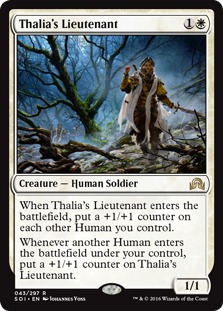
The first nightmare scenario is if you are playing against a deck like Mono-White (or Wr) Humans and, by the time you cast your Emrakul, the Promised End, your opponent has already dumped their entire hand onto the battlefield. What does Emrakul, the Promised End's "when cast" trigger do for you in this situation? Well, first of all you get to look through your opponent's sideboard, so you gain some information, which does have value, even if you end up losing the game. Scratch that first point, see the rules change just made for Emrakul. Second, you get to kill your opponent's best creature by attacking it into your Emrakul, the Promised End. Then, your opponent gets to untap, draw another card, and most likely attack you to death with a bunch of little White creatures.

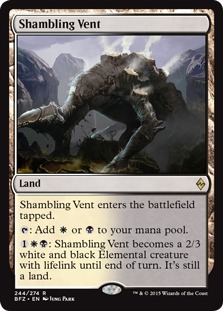

Nightmare scenario number two comes against a completely different type of deck: WB Control. Let's say you fight your way though a bunch of discard and disruption, and finally manage to cast an Emrakul, the Promised End. You draw for your opponent's turn, look at their hand, and see Planar Outburst, Shambling Vent, and Ob Nixilis Reignited. This situation plays out much like the Mono-White Humans example. You get to look at your opponent's sideboard and pass the turn. Your opponent draws an extra card, plays one of their two ways to kill your Emrakul, the Promised End, and goes on to win the game.
To be fair, you got a bit unlucky in both of these situations, but that makes sense because we are looking at the absolute worst case of controlling your opponent's turn. What you gain is some information about your opponent's deck and maybe a free Murder, assuming your opponent has a creature on the battlefield.
Sidebar: Sideboard Rules Change
Update: In the hours since I started writing this article, Wizards announced it was changing the rule that allows you to look at your opponent's sideboard while you control their turn. In fact, they are changing the rule to such an extent that you will never be able to look at your opponent's sideboard for any reason (which is relevant with another one of our early spoiler cards, Coax from the Blind Eternities).
My first instinct was to go back, change the article, and delete the references about getting to look at your opponent's sideboard, but the more I thought about it, the more I realized that adding this section might be better, because it reinforces just how much worse Emrakul, the Promised End is under the new rules. The floor of Emrakul, the Promised End is significantly lower now than it was yesterday. Under the old rule, there would have been times when you knew 100% you were going to lose the game but would try to stay alive just long enough to cast an Emrakul, the Promised End, simply to gain an information advantage, but those days are gone.
All in all, the rules change is good. Having a potential information advantage influencing the way you play the game is weird. On the other hand, it also feels weird that you can't search your opponent's sideboard with Burning Wish or Coax from the Blind Eternities if you control your opponent's turn. While these situations are admittedly fringe, it could happen in Standard sooner or later thanks to the interaction between Emrakul, the Promised End and Coax from the Blind Eternities. Personally, I wish that wishes still worked normally if you cast one while you control your opponent's turn, but I'm willing to give it a pass, simply because the interaction is unlikely to come up very often, if at all. Anyway, enough of this sidebar; let's get back to talking about Emrakul, the Promised End.
The Average Outcome of Controlling Your Opponent's Turn
Most of the time you are going to get a three-, four-, five-, or even six-for-one from our Emrakul, the Promised End trigger, but just how the advantages add up depends mostly on the matchup. So, instead of breaking down specific decks and hands, let's look at some of the things you can do while you control your opponent's turn.
- Use any "search your library" effects and fail to find. This one is actually a pretty huge deal. If you opponent has an Evolving Wilds (currently the fifth-most-played land in Standard), you can crack it and decide not to find a land, which not only puts your opponent down a land but also allows you to look through your opponent's library, giving you information that can be extremely valuable. You can see what unique cards you opponent is playing, and if it's game two, you can find out how they sideboarded. This point is important to remember if you are playing against Emrakul, the Promised End. There will be situations where you opponent casts an Emrakul and you feel you have a 5% chance of winning after the your opponent controls your turn. The correct play may be to scoop before your opponent gets to control your turn because the amount of information you're giving your opponent for games two and three is worth more than five percentage points.
- Cast your opponent's spell for no value. Collected Company? Oath of Nissa? Cast them and fail to find. Secure the Wastes? Not very good. Transgress the Mind or Duress? Cast it targeting your opponent to take their wrath or planeswalker. Chandra, Flamecaller? Minus X to wipe your opponent's board. Infinite Obliteration? Cast it naming Sarpadian Empires, Vol. VII. The possibilities are endless.
- Use your opponent's removal on their own stuff. When Emrakul, the Promised End was first spoiled, I had some people tell me it was bad because the opponent would just cast Declaration in Stone or Ruinous Path during their "extra" turn. Well, if your opponent has a Declaration in Stone left in their hand after you control their turn, you are doing it wrong, you got unlucky, or your opponent got lucky and drew the Declaration in Stone in their "extra" turn.
- Suicide attack. As I mentioned before, in the worst-case scenario, you can always attack your opponent's best creature into your Emrakul, the Promised End to kill it. But imagine you also have a Thought-Knot Seer and a World Breaker on the battlefield, turning the attack into a Plague Wind.
- Kill their planeswalkers. Sorin, Grim Nemesis is probably the best, because you can −X it all the way to zero and kill a second creature or planeswalker in the process, but even just ultimating a Gideon, Ally of Zendikar off the battlefield can be pretty good in some situations.
- Gain a psychological advantage. Having an opponent control your turn is one of the most depressing things that can happen in a game of Magic. There's such a feeling of helplessness as you watch all your plans crumble before your eyes. Getting destroyed by your own cards is tilting. As a result, there's some chance that simply resolving an Emrakul, the Promised End will throw your opponent off their game and make them give up. I can't even count the number of times I've scooped to an opponent's Mindslaver activation, not because I'm 0% to win, but because I don't want to go through the anguish of letting my opponent play with my cards.
The Ceiling of Controlling Your Opponent's Turn

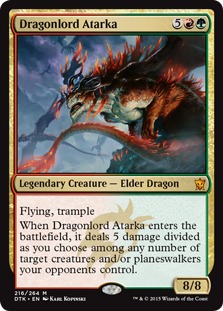
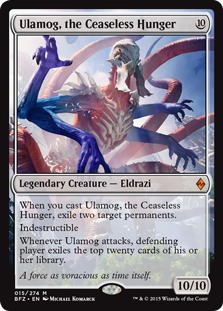
While the reverse Tragic Arrogance (keeping your Emrakul, the Promised End alive but killing all your opponent's best stuff) is probably my favorite, the ceiling on Emrakul, the Promised End's "control your opponent's turn" trigger is quite literally winning the game. If you are already ahead when you cast Emrakul, the Promised End, there's a decent chance your opponent will scoop to the trigger, since they won't want to give you additional information. If you are about even, Emrakul, the Promised End will win you the game in most situations. If you are a little bit behind, Emrakul, the Promised End will pull you even or ahead. The only situation where Emrakul, the Promised End isn't very helpful is when you are very, very far behind or when your opponent is empty handed. In these exact situations, something like Dragonlord Atarka or Ulamog, the Ceaseless Hunger might be better, depending on the situation.
The Verdict
In most situations Emrakul, the Promised End will generate more value than any of the other big fatties in Standard. Since you can always suicide attack your opponent's best creature, it's basically an Dragonlord Atarka with upside, unless your opponent is going extremely wide with X/1s. While Ulamog, the Ceaseless Hunger will often be better at killing planeswalkers, in just about every other aspect of the game, Emrakul, the Promised End takes the cake. It's better at dealing with creatures, gives you more information, and answers things in your opponent's hand that Ulamog, the Ceaseless Hunger cannot. While Ulamog, the Ceaseless Hunger is great, it's very possible to resolve a copy, exile a couple lands, and then lose to a 2-mana sorcery like Declaration in Stone, a sequence that is unlikely to happen with Emrakul, the Promised End.
The bottom line is that I expect Emrakul, the Promised End to be very strong in Standard, although it will be somewhat dependent on the meta. If super-aggressive Humans lists are all the rage, Emrakul, the Promised End will be worse, but that's true of any 13-drop. On the other hand, if things trend toward midrange or control, Emrakul, the Promised End has the potential to be one of the best cards in the format. At worst it's a 13/13, flying, trampling Nekrataal. At best, it just wins the game on the spot as a Mind Twist / Plague Wind split card.
Conclusion
Anyway, that's all for today. What do you think about Emrakul, the Promised End? Just how broken will it be in Standard? Does it have any potential in older formats? Is it worth playing self-mill cards to fill your graveyard and cast your Emrakul, the Promised End for less? As always, leave your thoughts, ideas, opinions, and suggestions in the comments, and you can reach me on Twitter @SaffronOlive, or at SaffronOlive@MTGGoldfish.com.













